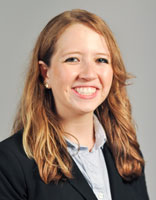 This post is written by Jehan El-Gabri, a second-year Duke Fuqua MBA candidate with a focus on finance and social entrepreneurship. Prior to Fuqua, she worked in education and as a federal policy consultant. At Fuqua, she is a COLE Leadership Fellow and co-president of Fuqua2Duke. This past summer, she interned with the social impact strategy firm Third Plateau in San Francisco. This summer, Jehan worked with Third Plateau.
This post is written by Jehan El-Gabri, a second-year Duke Fuqua MBA candidate with a focus on finance and social entrepreneurship. Prior to Fuqua, she worked in education and as a federal policy consultant. At Fuqua, she is a COLE Leadership Fellow and co-president of Fuqua2Duke. This past summer, she interned with the social impact strategy firm Third Plateau in San Francisco. This summer, Jehan worked with Third Plateau.
During my first year at Fuqua, I fully embraced the opportunity to be a student again. Having worked in education and policy, my transition to business school meant embracing the feeling like I was drinking from a firehose and learning as much as possible – beginning with what a debit and a credit mean in accounting.
While my first year sped by even faster than everyone had warned me it would, I was eager to put some of the skills I had developed into practice during my summer internship. This past summer I worked at Third Plateau, a social impact strategy firm that consults non-profits, foundations, and socially-driven organizations. As I reflect on my time spent there, three key takeaways stand out:
An MBA has ubiquitous application
While an MBA is traditionally thought of as a credential for those in finance, general management, or marketing, the skills my MBA education is teaching me have an even wider function. Supporting Third Plateau’s strategic planning work clearly proved this to me.
This summer, I had the opportunity to support a charter school in thinking through its strategic plan, including aligning its mission, goals, and 5-year growth plan. Tackling a large-scale challenge like this was something I was much better equipped to approach because of my strategy coursework at Fuqua and consulting experience through CASE i3.
Be sure to Step Up and Learn Up
Step Up and Learn Up were two of the core values at Third Plateau that specifically resonated with me. Step Up is all about seeking big challenges because those are the ones worth tackling and Learn Up is about being intensely curious.
Coming into the summer I was intentional about identifying specific skills I wanted to develop and then sought out opportunities to do so. For example, I wanted to apply what I had been taught in finance so I stepped up and asked to be included in a finance-heavy project. I was then put in charge of all the financial analysis, including putting together a pro forma budget for a $3 million grant to be used to launch a nonprofit’s new business line. This experience was invaluable in growing my skill set and would not have occurred if I hadn’t stepped up and embraced learning up.
An openness to feedback strengthens a team
Third Plateau uniquely challenged me to also lend a critical eye to my immediate surroundings. I was tasked with completing an internal consulting project with Third Plateau as my “client,” addressing a specific need of my choosing. Throughout the summer, I assessed the feasibility of a business development opportunity for Third Plateau. My work included a market and landscape analysis, stakeholder engagement, and a recommendation for a minimum viable product. Third Plateau’s culture of self-improvement and humility in welcoming and expecting constructive feedback was refreshing and a norm I aim to internalize.
I know that my experience at Third Plateau would not have been possible without the SIF Scholarship, and I am grateful for Fuqua’s commitment to supporting those of us working in the social impact space. With all that I have learned this summer, I am energized to return to Fuqua and finish out my second year.
The Summer Internship Fund (SIF) enables first-year Duke MBA students to learn about the rewards and challenges of social sector management without making a significant financial sacrifice. In addition, the program enables organizations that otherwise could not afford to hire MBA student interns to benefit from students’ expertise. The SIF has supported more than 170 students, distributed nearly $520,000, and helped to further the mission of many nonprofit and government organizations. Funds are raised through student fundraising and from donors who believe in the mission of the program. If you would like to contribute, you can donate online using your credit card.

